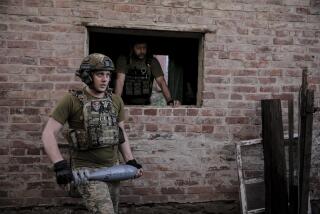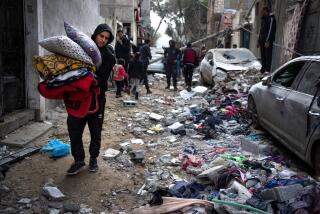We Must Ignore Protests and Defend Our Citizens
- Share via
The attack staged by U.S. forces against selected targets in Libya will not put an end to terrorism, but it was a necessary first step in what will inevitably be a long, difficult struggle to rid the world of this scourge.
At first blush, most Americans are naturally rallying to support President Reagan, but some voices of dissent can be heard, and as the dust settles more questions and challenges will be raised. These deserve to be answered, and answers are available.
Some say that this act will only provoke counterreprisals from Moammar Kadafi, and so it may. But for years we have refrained from any military response to the grisly deeds of Kadafi’s henchmen and other terrorists, and our very restraint has been a form of provocation. It has resulted only in more and more attacks against Americans. One air strike will surely not turn the tide, but it puts us on a path that can lead to success against terrorism. The United States has the power to make Libya pay a high price for its sponsorship of terrorism and to weaken its ability to continue such activity.
But aren’t terrorists fanatics, often willing to die for their cause, and therefore insusceptible to pressure or intimidation? This may be true for individual terrorists or small groups, but not for the governments that support them. Governments can be fanatical, but they rarely seek martyrdom. Those that provide financial and logistical support to terrorist groups can be forced to cease doing so. That will not eliminate terrorism, but it will severely curtail it.
Kadafi may or may not be “flaky” or “mad,” as the President has said, but he has never shown any inclination to sacrifice his own life, though he often exhorts others to sacrifice theirs. He keeps himself ever so well protected by a team of East German security specialists. Terrorists often are desperate people with little to lose, but Kadafi has plenty to lose. His whole adult life has been devoted to aggrandizing his own power, first at home and then in Africa and the Arab world. U.S. attacks on his military installations can deprive him of the means of projecting power abroad, and can threaten his power at home. Immediately after Monday’s raid, an exiled Libyan opposition leader in Egypt applauded the U.S. action.
Even if Kadafi is unmoved by damage to Libyan assets, it is hard to imagine that the entire Libyan government, including its military officers, will feel the same way. Perhaps at this moment they are rallying around their chief, but in Libya, as in the United States, hard questions are certain to follow. Surely there will be doubts about continued allegiance to a leader who seems prepared to sacrifice them all in a vastly unequal confrontation with U.S. forces.
In announcing the air strikes, Reagan said that the United States is prepared to do it again. Alas, we will probably have to do so before Kadafi is deterred or ousted. But the only alternative is endless forbearance, and that offers no hope at all.
Couldn’t we end terrorism, it is asked, by “solving the Palestinian problem”? But on what basis could the Palestinian problem be solved? No matter what concessions Israel might make, it is only the moderate Arabs who would be prepared to live in peace with it--but those moderates are not the ones who perpetrate or foment terrorism. The terrorists and their supporters have made clear again and again that no settlement except the elimination of Israel will satisfy them. Indeed, they have often targeted for assassination other Arabs who have sought peace.
Moreover, Kadafi, like the Ayatollah Ruhollah Khomeini of Iran, another principal sponsor of terrorism, nurses an animus toward the United States that equals or exceeds his animus toward Israel, which he often describes as merely an agent or an outpost of U.S. imperialism. They hate us not primarily because of our Middle East policies but because America represents everything that they fear, envy and detest.
But doesn’t our use of force alienate many other countries, especially in the Arab world? The Libya air strike has brought forth protests from many quarters, although those from other Arab countries seem hardly to have exceeded the minimum that they were obligated to express.
Even if the reaction were stiffer, we can more easily afford to ignore the protests than we can allow ourselves to be deterred from defending our own citizens. The United States is a big country, but, unlike some other powers, it is not out to subjugate anyone else. If it establishes the principle that it will strike back against those who deliberately go out to kill Americans, the rest of the world will adjust.
More to Read
Sign up for Essential California
The most important California stories and recommendations in your inbox every morning.
You may occasionally receive promotional content from the Los Angeles Times.













